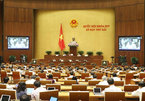 |
| The new Law on Public Investment is set to boost implementation of state-funded projects |
Compiled by the Ministry of Planning and Investment (MPI), the revised Law on Public Investment was adopted last week by the National Assembly (NA), with a series of brand-new provisions that create a sound legal framework for the government to conduct public investment.
The first new point of the law is the unification of the definition on public investment. Specifically, it regulates two types of public investment capital, including state budget and the capital from legal revenue of state agencies and public non-business units reserved for investment.
“This move is a very important change which simplifies the processes, order, and procedures of carrying out projects and public investment plans,” said Tran Quoc Phuong, director of the MPI’s Department for National Economic Issues, which is a member of the law’s Drafting Board. “There is no distinction among types of capital from the state budget like government bonds, national bonds, or investment credit.”
Phuong told VIR that the change also helps build a separate process for projects using capital from lawful revenue sources of state agencies and public non-business units which are reserved for investment according to the law.
This aims in the direction of strengthening decentralisation and self-responsibility of units and agencies with this capital source, while ensuring monitoring, supervision, and synthesis of reports.
In terms of obstacles in the procedures of implementing the law, Phuong added, “The law focuses on revising, supplementing, and improving the order, procedures, and decentralisation of authority to decide on investment policy of public projects.”
Meanwhile, according to NA deputy Truong Trong Nghia representing Ho Chi Minh City, the revised Law on Public Investment also clearly defines a number of tasks and types of projects which do not need investment policy decisions in order to remove formal and overlapping procedures, saving time and costs for project preparation.
NA deputy Hoang Quang Ham, representative of the northern province of Phu Tho, said that strong decentralisation of the right to decide investment policies ensures both the authority of the NA and People’s Council agencies, while increasing autonomy in accordance with the actual conditions of each locality.
“With this amendment, the provincial people’s councils have the authority to decide the investment policy of the localities’ Group A project by using any kind of funding, including support from the central budget,” he said.
Group A projects refer to projects of national significance in such sectors as security, defense, energy, natural resources, and seaports and airports.
Another important amendment is to clearly define the functions and authority of relevant agencies for the order and procedures for proposing programmes and projects using official development assistance and concessional loans of foreign donors, ensuring compliance with the Law on State Budget, and the Law on Public Debt Management.
Meanwhile, NA deputy Bui Van Phuong, presenting the northern province of Ninh Binh, noted, “An important new point of the law is to innovate the planning method, with the aim to better meet the operating practices of the economy, and overcome the biggest obstacles to public investment.”
According to Phuong, in order to decide on the investment policy of a project previously, it was necessary to determine the source of capital and the ability to provide capital based on projects. Thus, a vicious loop had been created with no exit solution to handle.
“The revised Law on Public Investment has introduced a plan for capital resources and the ability to provide capital beforehand, so that there is a legal basis for ministries, agencies, and localities to implement procedures to approve project investment guidelines,” Phuong said.
According to many NA members, the implementation of the law will contribute to boosting public investment disbursement speed, which has been long delayed thus far. VIR
Phuong Hao

Amended tax and public investment laws passed
National Assembly (NA) deputies on Thursday passed the draft amendment of the Law of Tax Management with 91.32 per cent of all deputies approving the draft law.

Vietnam ministry to finalize investment law on basis of PPP
The Ministry of Planning and Investment (MPI) is under the process of drafting up the investment law on the basis of public-private partnership (PPP), the governmental portal reported.

Revised Public Investment Law gears toward progress
Tran Quoc Phuong, director general of the National Economic Issue Department under the Ministry of Planning and Investment, talks to Diễn đàn Doanh Nghiệp (Business Forum) about the revised Law on Public Investment.
 New hallmark revisions to the existing Law on Public Investment have been established in the picture of public investment in Vietnam, enabling the country to invest in projects more effectively.
New hallmark revisions to the existing Law on Public Investment have been established in the picture of public investment in Vietnam, enabling the country to invest in projects more effectively.